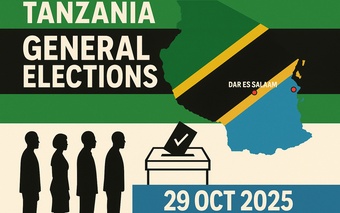On 29 October 2025, Tanzania will
hold its general elections to elect the President, members of the National
Assembly, and local ward councillors.
The ruling party, Chama Cha Mapinduzi (CCM), which has held power in one form
or another since independence in 1961, is widely expected to extend its
long-standing dominance
On paper, the election offers
Tanzanians an opportunity to articulate their voices through the ballot, but in
practice, the environment presents significant structural hurdles: major
opposition figures are barred, leading parties are excluded, and concerns about
fairness are widespread.
These dynamics raise fundamental
questions about the quality of electoral competition and what the outcome means
for governance, legitimacy and long-term national development.
At the centre of the contest is Samia Suluhu Hassan, Tanzania’s first female head of
state and the CCM’s candidate. She assumed office in 2021 following the death
of her predecessor and now seeks democratic endorsement. However, several of
her key opposition rivals are either banned or in detention. For example, Tundu
Lissu, a high-profile opposition figure and former challenger, is jailed on
treason charges. The main opposition party, Chama Cha Demokrasia na Maendeleo
(CHADEMA) was disqualified for failing to sign a required code of conduct.
Thus, while the ballot formally
lists multiple contenders (some 16 other presidential hopefuls according to
official data), the degree of real competition appears minimal. Analysts
suggest that with the two largest opposition parties either excluded or
suppressed, the outcome is all but predetermined, raising concerns about the
authenticity of voter choice.
A number of critical issues are
informing Tanzanian public sentiment ahead of the vote. Economically, Tanzania
has performed relatively well compared to some regional peers, with resilient
growth, lower external debt risk, and stable inflation often cited. But
political freedom and democratic space are seen to be narrowing. Reports of
opposition suppression, enforced disappearances, and restricted civic space
have raised alarms among human rights groups and democratic watchers.
Voter apathy is another concern.
With the outcome viewed as foregone and meaningful competition constrained,
many young people and rural voters are disengaged. Some observers warn that low
turnout may further erode the election’s legitimacy. Additionally, the possibility of internet or
social media restrictions on election day has been raised, which could dampen
transparency and citizen monitoring.
From an international standpoint,
the 2025 Tanzanian elections are receiving scrutiny. Organisations such as
Amnesty International and Human Rights Watch have cautioned that the process
risks becoming “procedural” rather than meaningful, pointing to structural
biases detrimental to genuine choice. Analysts argue that much of Tanzania’s
future development hinges not only on economic indicators but on strengthening
accountability and civic space.
In a broader East African and
African context, the outcome has ramifications for debates around multi-party
democracy, regional stability, and how long-standing ruling parties can adapt
to changing demographics and demands.


 Take Voters' Compass
Take Voters' Compass